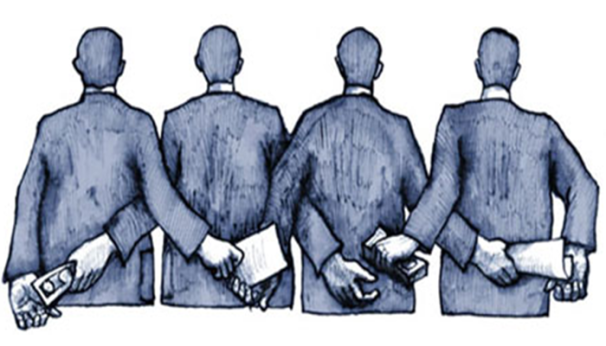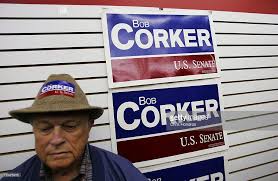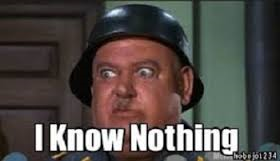
The Big Short – Corker style.
When last we left you, Bob Corker had just backed his way into a U.S. Senate seat. We also told you at the close of our last story that we would explore what happened a $28.1 million debt that Corker was on the hook for as a result of the sale of his commercial real estate business to his friend, the controversial Chattanooga businessman, Henry Luken.
But all you readers, haters, politicos and hangers-on will have to cool your heels a little longer. Before we unveil that sordid story in Part 2, we first need to present what we call “Part 1.5” – The Big Short, Corker Style.
What Did Corker Do With All That Cash?
Before the debt came due and before the Wells Fargo involvement, Corker found himself with a big pile of cash to play with. It’s hard to tell exactly how much Bob Corker made from the sale of his business to Henry Luken, but it’s safe to say is was a whole butt load of money – anywhere between $11 million and $55.5 million. As anyone who has ever had access to that kind of cash will tell you, the first thing you need to do is diversify and invest it, hopefully in vehicles that will give you a nice, safe return (remember that word “safe.” It will become important as you work your way through our story).
Initially Bob did what you would think a newly rich developer would do – he invested in real estate and banks. Corker made sizeable investments in AIG, Fannie Mae, Freddie Mac, Bank of America, etc. In other words, he bet ON the nation’s housing market continuing its climb. This was late 2006 and early 2007. Little did Bob know (but would soon learn as a Senator) of the looming cataclysmic meltdown of the nation’s financial system, closely tied to many of the very institutions with whom he had just placed a multi-million dollar personal bet. But as the newest member of the Senate, Corker was about to be let in on a very big secret.
In his new position, Corker became privy to exclusive information that was voluminous and frightening. By the summer of 2007 word of what was happening began to leak out from behind the closed doors of the offices where Corker had been allowed into. And just before the unsuspecting American public caught on, Corker did something bad. Very, very bad.
Just before all hell broke loose in the housing market, Bob Corker took a curious but revealing action: He completely reversed his financial position which was heavily vested in companies that benefit when real estate rises, and instead put millions into investments that would go up as real estate and the country was going down. In short:
Bob Corker bet against America.
He bet against the very market (housing) that he was overseeing from his position on the Banking committee. He bet against his former colleagues in the real estate and development community (including his friend, Henry Luken). He bet against the equity contained in average Tennesseans’ homes and he bet against the mortgages that secured that equity. Millions of Americans thought their biggest personal investment – their home – was a very safe place to have their money invested. After all, as the old saying goes: “God ain’t making more land, so real estate is always going to go up.” Except it didn’t.
But Bob Corker bet against America.
Simply put, Bob Corker and his fellow senator Mark Warner (D-VA) used their inside knowledge of the coming meltdown and an obscure Chattanooga hedge fund to “short” the housing market and reap millions for themselves while millions of Tennesseans and Americans were seeing their biggest investment (their home) disappear.
Bob Corker bet against America.
How Corker did this so unbelievably sleazy, venal and dishonest that it will take your breath away. And it will make you sick to your stomach that someone the public trusted with a U.S. Senate seat would use the power that came with that position to make himself even richer while the public suffered.
The Big Short
 As a member of Senate Banking, Bob Corker was supposed to be helping oversee the growing housing crisis. Instead he saw an opportunity to get rich. With insider knowledge of what was about to happen, Corker looked for a way to re-direct his personal money. He found it in a little-known hedge fund in Chattanooga – the Pointer Fund.
As a member of Senate Banking, Bob Corker was supposed to be helping oversee the growing housing crisis. Instead he saw an opportunity to get rich. With insider knowledge of what was about to happen, Corker looked for a way to re-direct his personal money. He found it in a little-known hedge fund in Chattanooga – the Pointer Fund.
The Pointer Fund was ideal. It had been around a while and was run by a close Corker ally, Joe Davenport. Pointer immediately turned Corker’s money over to Cedar Hill, another hedge fund located in New York City which specialized in the type of investments that Corker wanted them to make based on his knowledge of what was about to happen.
Cedar Hill gained notoriety in the best-selling book “The Big Short” (later made into an Academy Award-winning movie). By running the investment through Cedar Hill, Corker was given a fig-leaf to claim he didn’t know what Pointer was doing with his money. But Corker didknow. There is a direct financial connection between Corker and Cedar Hill. The two founders of Cedar Hill have donated nearly $12,000 to Corker. What makes their donations stand out even more is that these hedge funders have rarely donated to congressional campaigns. In fact, the money they gave Corker represents 55% of the total donations they have ever given to congressional candidates. More than half of what these New Yorkers have ever donated went to a junior senator from Tennessee! Corker has since taken the Sgt. Schultz defense (“I know nothing! Nothing!”) when asked about the Cedar Hill connection.
than half of what these New Yorkers have ever donated went to a junior senator from Tennessee! Corker has since taken the Sgt. Schultz defense (“I know nothing! Nothing!”) when asked about the Cedar Hill connection.
The deal was so sweet, Corker cut in his buddy on the Banking committee, Sen. Mark Warner — a liberal Democrat from Virginia. It strains credulity to the breaking point that a wealthy senator from the Washington DC suburbs would somehow accidentally find an obscure hedge fund in Chattanooga and invest millions in it just in time to reap a huge profit – and profit they did. Pointer, the hedge fund that both Corker and Warner had invested in, made $120 million on the payments from the trade. You read that right: ONE HUNDRED AND TWENTY MILLION DOLLARS. One trade. One, big, short.
Corker and Warner knew what was about to happen. The system was greased and rigged. And Bob Corker used his senate position to make a killing at the expense of hard-working Tennesseans and millions of others across the country.
Was what Corker did illegal, or just grossly unethical? Probably both.
One last note: By betting against housing and real estate with his insider knowledge, Corker was in effect also betting against the person who made it all possible by buying out Corker in the first place – Henry Luken. What a guy, that Bob.
NEXT:
As we shall see in Part Two, the housing crisis would nearly bankrupt Luken and cause Corker some sleepless nights. How they bailed themselves out of trouble with the help of Wells Fargo is fascinating. And perhaps seriously illegal. But we’ll let the voters and the regulators be the final judge,
